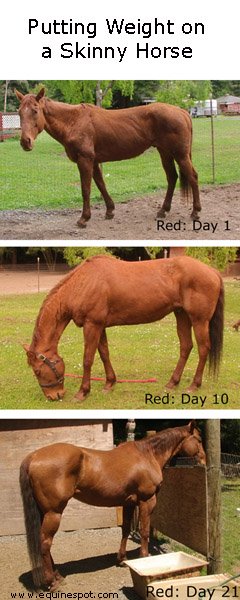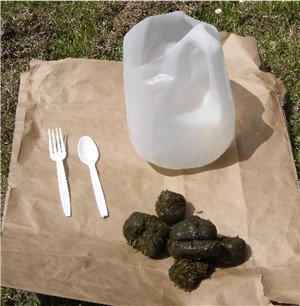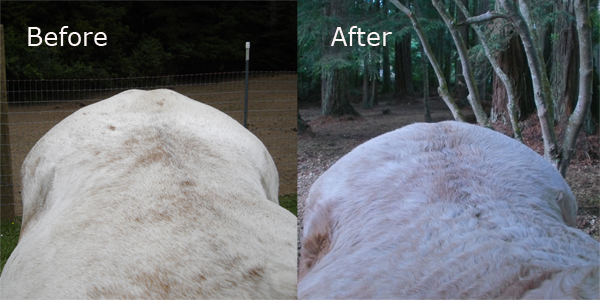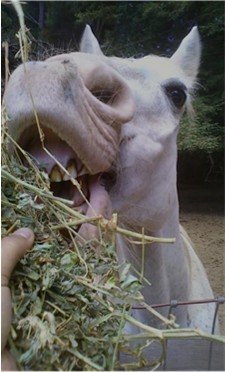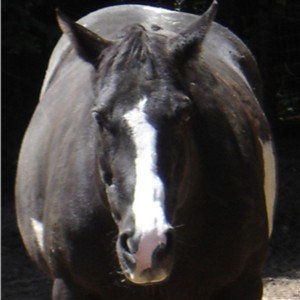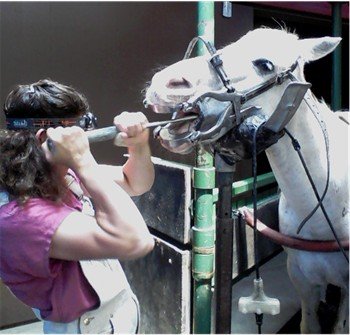Horse Weight Loss: How To Deal With It
Dealing with horse weight loss? Are you having trouble keeping weight on a hard keeper? Are you trying to bring a neglected horse back to health? Is your senior horse's weight just not up to par? Find out what you can do to get your horse to gain weight and keep it on.
3 Major Reasons Horses Loose Weight
- Not enough calories are being consumed
- The food eaten is not properly digested
- The horse has an underlying illness
In order to put weight on a horse and keep it on you must first determine why the horse is underweight to begin with. It could be simple as the horse just needs more feed or something more complicated like a digestive or health problem.
Horse Weight Loss Due to Poor Digestion
A horse can be consuming plenty of feed, but if they are unable to properly digest those calories, they will loose weight anyway. Consider these:
Teeth:
A horse that is unable to properly chew their feed can't
break the food down enough to digest it. Make sure the horse is current on
dental care. With some horses all they need is a proper teeth floating and the
problem is solved.
Parasites:
Internal parasites are a common cause of horse weight loss. A horse with a heavy parasite load will suffer
nutritionally. Make sure the animal is dewormed regularly.
Also realize that a horse that has suffered from long term exposure to internal parasites can develop scar tissue in the intestinal lining. Scar tissue here makes digestion much less efficient.
In this case feed the horse free choice fine stemmed hay like grass hay and supplement with an easy to digest grain. Commercial senior horse feed grains are good for this.
Maintaining the Toothless Horse
Feeding a horse with no teeth? Feed beet pulp and alfalfa pellets soaked in water. Supplement with rice bran pellets.
Did you know that a horse with no teeth at all can get all the roughage they need from beet pulp?
Probiotics:
Horses can loose the good bacteria in the gut that aids in
digestion. This can be caused by many things including overeating grain, stress,
parasites and colic. You can replenish the gut flora by giving probiotics to
your horse. 1-3 doses of probiotics can get the digestive system back in good
working order.
Sand:
Sand is another suspicious culprit that can interfere with the healthy function of the digestive system. Horses that eat directly off the bare ground or pull up chunks of dirt while grazing can accumulate sand in the gut. It's never a bad idea to run a sand test on a horse that is underweight.
Easy Sand Test
Easy Sand Test - An easy sand test at home is a simple way to find out if your horse has sand in their gut. If your horse tests positive, you can do something about it.
Age:
Horses digestive systems tend to slow with age and become
less efficient. Easy to digest feeds will help a senior horse. Again, think
fine stemmed hay and senior horse feed grains. Shredded beat pulp or beet
pellets soaked in water are also a good source of easy to digest roughage.
Especially for a horse with poor teeth or no teeth.
If you are needing to put weight on your senior horse, I highly recommend adding stabelized rice bran to their feed. This rice bran comes in a small pellet form and looks a bit like chicken feed.
Stabelized rice bran is high in fat content. It is an easy to digest healthy kind of fat for good calorie content, yet is not considered a 'hot' feed. Introduce rice bran slowly into the diet so as not to cause colic.
Stress:
Have you ever been so upset you lost your appetite or gave
yourself an upset stomach? Stress can
affect horse weight loss and digestion the some way. Stress can cause a horse to produce
too much stomach acid. Stress can cause diarrhea. Stress can cause the gut to
slow down and result in colic.
Digestive upset from stress can be a one time event, like a long trailer haul or something more chronic. Give a dose of probiotic. Evaluate your horse's living situation. Are they living in poor housing conditions? Are they too hot, too cold, too confined, too bullied, too overworked or too much of anything that acts as a chronic source of stress? If so, try to remedy the situation.

Horse Weight Loss Due to Too Few Calories
Sometimes horses just need more calories than they are getting or at least more calories than you think they are getting.
If your horse is out to pasture, is your pasture overgrazed? If someone else is feeding your horse, find out how much is being offered and what quality of hay is used. Poor quality hay just won't cut it for a horse.
Is your horse actually getting the food you give it? Make sure they are not being run off their feed pile by more aggressive pasture mates. If they are, fix the situation.
When Horses Need More Calories
- Hard work - increase the grain calories, consider adding oil to the feed
- Cold weather - increase the roughage in the diet: hay digestion produces heat
- Pregnancy - she's eating for two, follow your vet's recommendations
- Growth spurts - follow your vet's recommendations
- Breeding stallions - consider rice bran as a 'cold' energy source
- High metabolism - add more fat calories to the diet
Horse Weight Loss in the Hard Keeper
A Note About Rice Bran
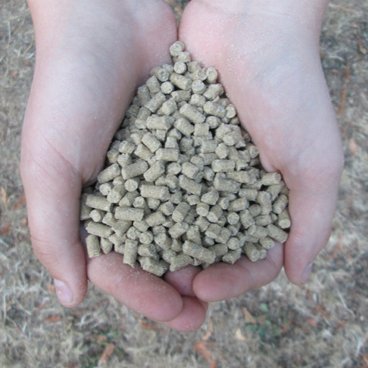 Rice bran
Rice branFeed a commercially prepared stabilized rice bran pellet that has calcium added so as not to disrupt the calcium phosphorus ratio in the diet.
* Unstabilized rice bran is effective but has a shorter shelf life, and can go rancid if left to sit. Personally I have found that I go through it too fast for spoilage. Just be sure to buy it from a feed store that has a high turnover rate for the freshest supply. It also may not have Calcium added, requiring the need to also feed Alfalfa hay to balance the Calcium Phosphorus ratio (check the label for Calcium)
It's just common sense to increase the calorie intake of a horse that is working hard or is pregnant and such. But let's face it, some horses are just plain 'hard keepers'. Hard keepers are horses with a high metabolism.
They seem to be bottomless pits that you can pour the feed into with seemingly no weight gain in return. These horses will always need more calories than other horses.
As with any underweight horse make sure you have addressed issues with teeth, parasites and environmental stresses.
Hard keepers often do not thrive on grass hay. They need the extra energy that alfalfa offers. By the same token, offering grass hay in between meals is a great stress reliever to high strung horses. Consider feeding the hard keeper more than twice a day if possible.
Hard keepers generally require a fair bit of grain concentrates just to maintain body weight. To prevent weight loss and encourage weight gain, you need to add more fat calories to the diet.
Flax seed oil is the preferred oil to feed horses (can be given as a commercially prepared flax seed meal too). It is high in the good Omega-3 fatty acids. Another very good source of fat is stabilized rice bran pellets. Both of these fat sources are easy to digest and will not make your horse hot.

Horse Weight Loss Due to Malnutrition
If you are dealing with a rescue horse suffering form malnutrition, great care must be taken not to overwhelm the horse's system.
This horse is 250-300 lbs underweight
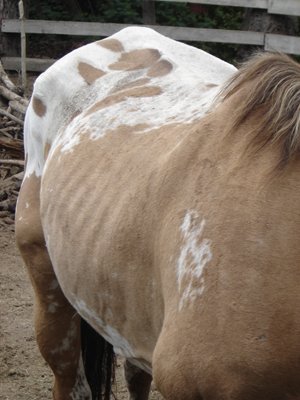 Severely malnourashed horses must be brought back carefully
Severely malnourashed horses must be brought back carefullyA trip to the vet is likely in order to check the condition of the teeth and a recommended deworming program. Deworming a horse with a heavy parasite load must be done with care so as not to cause a worm impaction colic. The horse will likely need several repeat doses of probiotic.
The more severe the malnutrition the slower you must proceed. Do not turn the horse out into open pasture or free choice feed until her system is ready to handle it. Start by offering several small meals a day. Nothing rich. Just quality grass hay.
Over time increase the amounts of hay and begin to add grain concentrates. A good mix is a bit of oats mixed with soaked beet pulp, rice bran and a handful of loose rock salt.
Offer free choice water and a blanket in cold, wet or windy weather so the animal is not burning calories just to stay warm.
If none of these feed solutions helps with horse weight loss, you may be dealing with an underlying health condition. A vet check is in order. Your vet will likely include a blood test with a full exam to determine why the horse is not thriving.
More on Equine Care
Horse First Aid Kit
Find out what items you need to build a well rounded horse first aid kit for your barn, your truck and on the trail.
Return to the top of Horse Weight Loss
